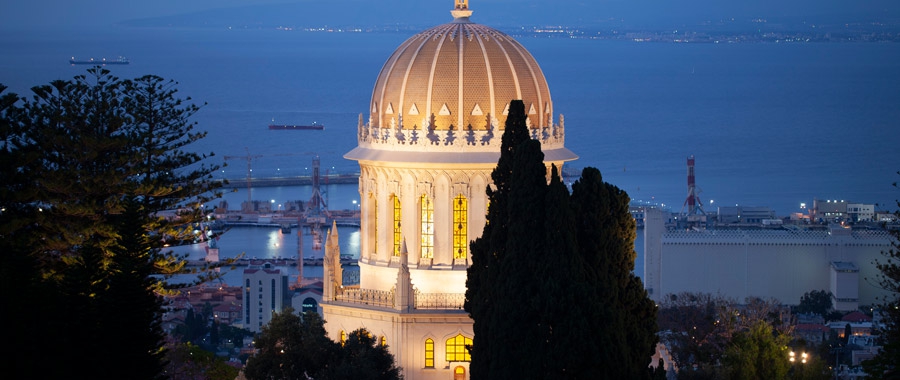The views expressed in our content reflect individual perspectives and do not represent the authoritative views of the Baha'i Faith.
What does the word “Baha’i” actually mean? It comes from Baha’u’llah – the prophet and founder of the Baha’i Faith – whose title means “The Glory of God.” A Baha’i, then, is a follower of the glory.
Baha’u’llah’s given name was Mirza Ḥusayn-Ali Nuri, and the title of Baha was adopted by him during the time when he was a follower of the Bab. To break with the traditions of Islam, many of the followers of the Bab adopted non-Muslim names.
Baha’u’llah was born in Tehran, Persia on the 12th of November 1817 into a noble, respected and wealthy family. A career in government was open to him because his father was a minister of state in the court of the King. However, Baha’u’llah had no interest in politics, and like Jesus, his kingdom was not of this world.
Baha’u’llah’s mission began in August 1852 in a subterranean dungeon in Tehran’s notorious Siyah-Chal (Black Pit) prison, where he was confined during the height of the persecution of the followers of the Bab. In this dungeon, Baha’u’llah received his revelation.
All messengers of God receive their revelations in a distinctive way: Moses was given the commandments of God from a burning bush on the slopes of Mount Sinai; Jesus received the Holy Spirit in the form of a dove which descended upon him while he was being baptized in the River Jordan; Muhammad was visited by the archangel Gabriel and given the surahs of the Qur’an.
Baha’u’llah described the moment of his revelation in an Epistle to the Persian King, Nasiri’d-Din Shah, who had confined him in the Black Pit of Tehran and then exiled him from his native land:
O King! I was but a man like others, asleep upon my couch, when lo, the breezes of the All-Glorious were wafted over Me, and taught Me the knowledge of all that hath been. This thing is not of Me, but from the One Who is Almighty and All-Knowing. He bade Me lift up My voice between earth and heaven, and for this there befell Me what hath caused the tears of every man of understanding to flow … This is but a leaf which the winds of the will of Thy Lord, the Almighty, the All-Praised, have stirred … His all-compelling summons hath reached Me, and caused Me to speak His praise amidst all people. I was indeed as one dead when His behest was uttered. The hand of the will of Thy Lord, the Compassionate, the Merciful, transformed Me. – Baha’u’llah, quoted by Shoghi Effendi in God Passes By, p. 102.
Baha’u’llah, being very generous and forgiving here, described the floor of the dark, infested and fetid dungeon into which the King had thrown him as a “couch.” Towards the end of his life, Baha’u’llah, writing about his early experiences, included a brief description of the conditions in the Black Pit:
We were consigned for four months to a place foul beyond comparison. The dungeon was wrapped in thick darkness, and our fellow-prisoners numbered nearly a hundred and fifty souls: thieves, assassins and highwaymen. Though crowded, it had no other outlet than the passage by which We entered. Most of these men had neither clothes nor bedding to lie on. God alone knoweth what befell Us in that most foul-smelling and gloomy place. – Baha’u’llah, Epistle to the Son of the Wolf, pp. 20-21.
It was a cruel time for the followers of the Bab. Each day the guards would descend the three flights of stairs into the Pit, seize one or more of the Babi prisoners and drag them out to be executed. In the streets of Tehran, Western observers were appalled by the scenes of the followers of the Bab being blown out of the mouths of cannons, hacked to death with axes and swords, and led to their deaths with burning candles inserted into wounds cut into their bodies. It was in these circumstances, and faced with the prospect of his own imminent death, that Baha’u’llah received the first intimation of his mission:
During the days I lay in the prison of Tehran, though the galling weight of the chains and the stench-filled air allowed Me but little sleep, still in those infrequent moments of slumber I felt as if something flowed from the crown of My head over My breast, even as a mighty torrent that precipitateth itself upon the earth from the summit of a lofty mountain. – Ibid., p. 22.
That mighty flowing torrent, Baha’u’llah wrote, reassured him that the newly-conferred spiritual mission God had given him would not only survive but succeed:
One night, in a dream, these exalted words were heard on every side: “Verily, We shall render Thee victorious by Thyself and by Thy Pen. Grieve Thou not for that which hath befallen Thee, neither be Thou afraid, for Thou art in safety. Erelong will God raise up the treasures of the earth – men who will aid Thee through Thyself and through Thy name, wherewith God hath revived the hearts of such as have recognised Him.” – Ibid., p. 21.
This series of essays is adapted from Joseph Roy Sheppherd’s book The Elements of the Baha’i Faith, with permission from his widow Jan Sheppherd.
















Comments
Sign in or create an account
Continue with Googleor